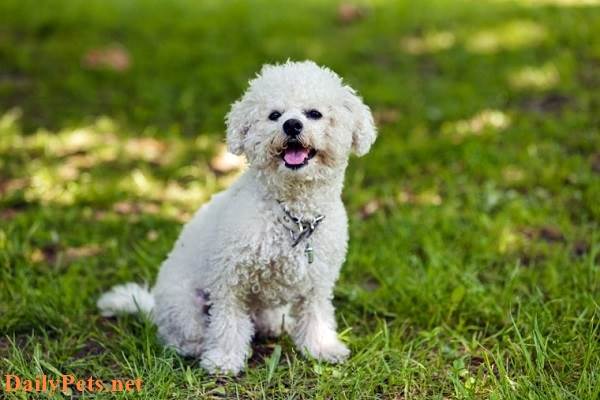They are especially child-friendly. Through this article, let’s learn about the origin, characteristics, and ways of caring for Bichon Frise dogs.
Learn about the Bichon Frise dog breed
Origin of Bichon Frise dog
The Bichon Frise breed is a dog breed that originated in the Mediterranean region and appeared in the Middle Ages. This is a cross between two species, the Barbet Water Spaniel and the French Poodle. The name “Bichon Frise” was born when they became popular in the 15th century, after the Franco-Italian war, and were quite popular pets with European nobility.
Bichon Frise dog classification
Currently, Bichon Frises are divided into four types: Maltaise, Tenerife, Ilvanese, and Bolognese.

Bichon Frise Dog.
Popular Bichon Frise dog coat colors
Bichon Frises have a light coat color, mainly white, cream, apricot, or gray. In particular, the most popular coat color of Bichon Frise dogs is white.
Bichon Frise dog appearance characteristics
This dog looks like a soft cotton ball with a cute, fluffy coat. Normally, an adult Bichon Frise dog weighs about 7kg, and the average height, if measured from the foot to the top of the head, will be 35cm. They have a slightly rounded skull, black non-pointed snout, and large round eyes.
The Bichon Frise breed is quite petite, short-legged but well-proportioned, and looks exceptionally full. In addition to the smooth white coat around the ears, muzzle, feet, or on the body, there is also the appearance of apricot or cream color.
Bichon Frise dog personality traits
This is a dog breed that is considered to be extremely gentle, lovable, and friendly. They are very close to humans and very affectionate. Especially extremely gentle with children and love to be pampered and indulged by the owner.
Bichon Frises are also very easy to train and train, so you can easily teach them without much effort. Bichon Frise dogs are brilliant, energetic, and always responding to the requirements of their owners.
However, because of the Bichon Frise’s indulgent personality, they will easily feel lonely and sad when you ignore or don’t care about them. In addition, if they are spoiled too much, they can form bad habits such as laziness, whining, sulking, etc.
How to care for a Bichon Frise dog
Bichon Frise dog food
As a dog with a poor digestive system, you must be extremely careful when choosing food for your Bichon Frise dog. Dog food should be quality-tested, full of nutrients, and safe. Depending on their stage of development, you can give your Bichon Frise milk, eat food like people or nuts, meat, fish, …
Diet of a Bichon Frise dog by stage
Bichon Frise dogs under 3 months old: You should give them milk, divided equally from 3 to 4 times a day during this period. In addition to letting them get used to foods other than milk, you can puree porridge with meat, vegetables, and tubers and let them practice eating them gradually in small portions.
Bichon Frises from 3-6 months old: You can introduce them to foods that provide more nutrients, such as meats, eggs, vegetables, tubers, and dry foods, such as nuts. You should feed them about 2-3 meals/day with 100-150g of food each time.
Bichon Frise dogs six months and older: This is the period of muscle and joint development, so you need to supplement them with foods rich in calcium, protein, and fiber. Especially should increase the diet and only feed them two meals/day.
How to care for and hygiene for Bichon Frise dogs
Bichon Frise dogs have thick and ruffled coats, so you need to spend time regularly taking care of them and cleaning them periodically. You should brush your Bichon Frise’s hair twice weekly to keep the coat soft. In addition, you also need to pluck their ears, clean their eyes, brush their teeth, and trim their toenails regularly.
Bathing Bichon Frise dogs should pay attention to using a separate dog shampoo and drying after bathing. Remember to wash and clean them regularly; otherwise, their fur will not keep its color, and the bacteria and dirt that come into contact with them will affect their health.
Common Bichon Frise dog health problems
Dental disease is one of the most common diseases of dogs, and so are Bichon Frises. If you do not clean your teeth regularly, it is very easy for tartar to accumulate on your teeth and infect gums and roots. This causes Bichon Frise dogs to develop liver, kidney, and joint diseases, reducing their lifespan.
In addition, Bichon Frise dogs are also very susceptible to infections and infections that cause diseases such as parvo and rabies. Especially Bichon Frise dogs can suffer from parasites such as fleas, ear mites, and helminths. So you should pay attention to vaccinations and add enough nutrients to their meals.
Bichon Frise dogs are also very susceptible to obesity, which affects bones and joints, which you should also pay attention to when building their diet and activities. In particular, Bichon Frise dogs are susceptible to serious eye problems such as cataracts and glaucoma, making them uncomfortable, even blind.
Notes when caring for Bichon Frise dogs
The Bichon Frise is a dog that needs extremely careful care regarding diet, hygiene, and health. They are prone to mental and physical problems, so you must monitor and ensure a scientific lifestyle. In particular, newborn Bichon Frise puppies from 8 to 12 weeks old must be vaccinated at least twice. After one year of age, it is necessary to vaccinate and have periodic health check-ups at least once a year.





